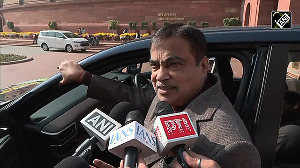The latest PNB fraud is a failure of management supervision and accountability, as no bad debt was generated and no cash was involved

Image: A security guard stands guard inside a Nirav Modi showroom during a raid by Enforcement Directorate. Photograph: Adnan Abidi/Reuters
The fraud perpetrated against Punjab National Bank (PNB) raises grave concerns about the banking sector’s risk management system and fraud detection ability, and shows that despite all the checks and balances in place, a scam can take place bypassing the whole system.
Lenders, particularly public sector banks (PSBs), recently came under criticism by the Reserve Bank of India (RBI) for “lack of effective risk management practices”.
RBI Deputy Governor N S Vishwanathan blamed banks for the bad debt mess and said if they had been practitioners of good risk management, the non-performing assets (NPA) stock would have been far more moderate.
While the latest fraud is a failure of management supervision and accountability, as no bad debt was generated and no cash was involved, the incident validates Vishwanathan’s assessment about PSBs’ clumsy-footedness.
With this fraud, the problem of public sector banking as well as the failure of systems, oversight and procedures have acquired a whole new dimension, say experts.
First of all, it raises several questions about the monitoring system in PNB itself.
It seems two employees at PNB’s Mumbai office bypassed the core banking system and raised separate payment instructions through the SWIFT global payment system.
There was no effective audit, or reconciliation of transactions with bank books on transactions undertaken through SWIFT, say experts.
Incidentally, the maximum LoU (letters of undertaking) allowed to be raised is $20 million per transaction for a period of up to three years.
This would mean multiple LoUs were raised by these staff off the book of the bank.
According to an auditor, the same can be done and even become part of the book as individual SWIFT transactions are not scrutinised and the net amount is taken during the book closure.
But any mismatch can be easily caught by running a computer check, the auditor said. Clearly, this was not practiced in PNB.
Now, banks would be demanding PNB their money back by invoking the guarantees.
The banks lent the clients on the strength of PNB’s guarantees.
Now, if PNB pays up on the guarantees, other banks will not suffer losses.
But, if PNB contests, arguing that these were fraudulent guarantees, then there would be a fight between banks.
The first signs of such happening was apparent as, bankers say, PNB has already tried to blame other banks for letting millions of dollars worth of transactions go through without doing their due diligence and checking with the bank that had supposedly issued the guarantees.
But, bankers say no bank needs to check a SWIFT instruction unless there is something really suspicious.
For example, in February 2016, $1 billion worth of SWIFT transactions request purportedly from Bangladesh’s central bank to the US Federal Reserve was stopped mid-way as the hacker had a typo in the name of the beneficiary account in Sri Lanka.
But, three dozen transactions had already been executed through the same route and money deposited in the fraudsters’ accounts.
This was what the modus operandi of the fraud, which apparently continued since 2011 and nobody noticed.
The fraudulent transactions involving businessman Nirav Modi first came to light late last month when PNB found that two of its bank staff - one branch deputy manager (who has now retired) and a bank clerk - had colluded with Diamond R US, Solar Exports and Stellar Diamonds to issue a fake letter of undertakings (LoU) worth Rs 280 crore without following due procedures.
Modi, his brother Nishal Modi, wife Ami Nirav Modi and maternal uncle Mehul Chinubhai Choksi (owner of Gitanjali Gems) are partners at these firms, according to the complaint filed by PNB with the CBI.
The firms approached the PNB’s Brady House branch in Mumbai with a set of documents for importing goods with a request to allow buyers’ credit for making payment to overseas suppliers through LoUs on January 16.
The branch asked the firms to furnish at least 100 per cent cash margin for the LoUs to raise credit.
While the firms contested, saying they have already availed of similar services from the bank in the past, the records at the bank branch showed otherwise.
This led to suspicion among bank officials, who on verification found that eight “fake” LoUs worth Rs 280 crore were issued in a span of six days between February 9 and February 14 in 2017.
The bank staff obtained required approval of the authorities without making any entry in the bank’s system so that the transaction is undetected.
The bank officials transmitted SWIFT instructions to the Hong Kong branches of Axis Bank and Allahabad Bank to raise buyers’ credit.
The due date for the payment was January 25, 2018, favouring Axis Bank and Allahabad Bank branches in Hong Kong.











